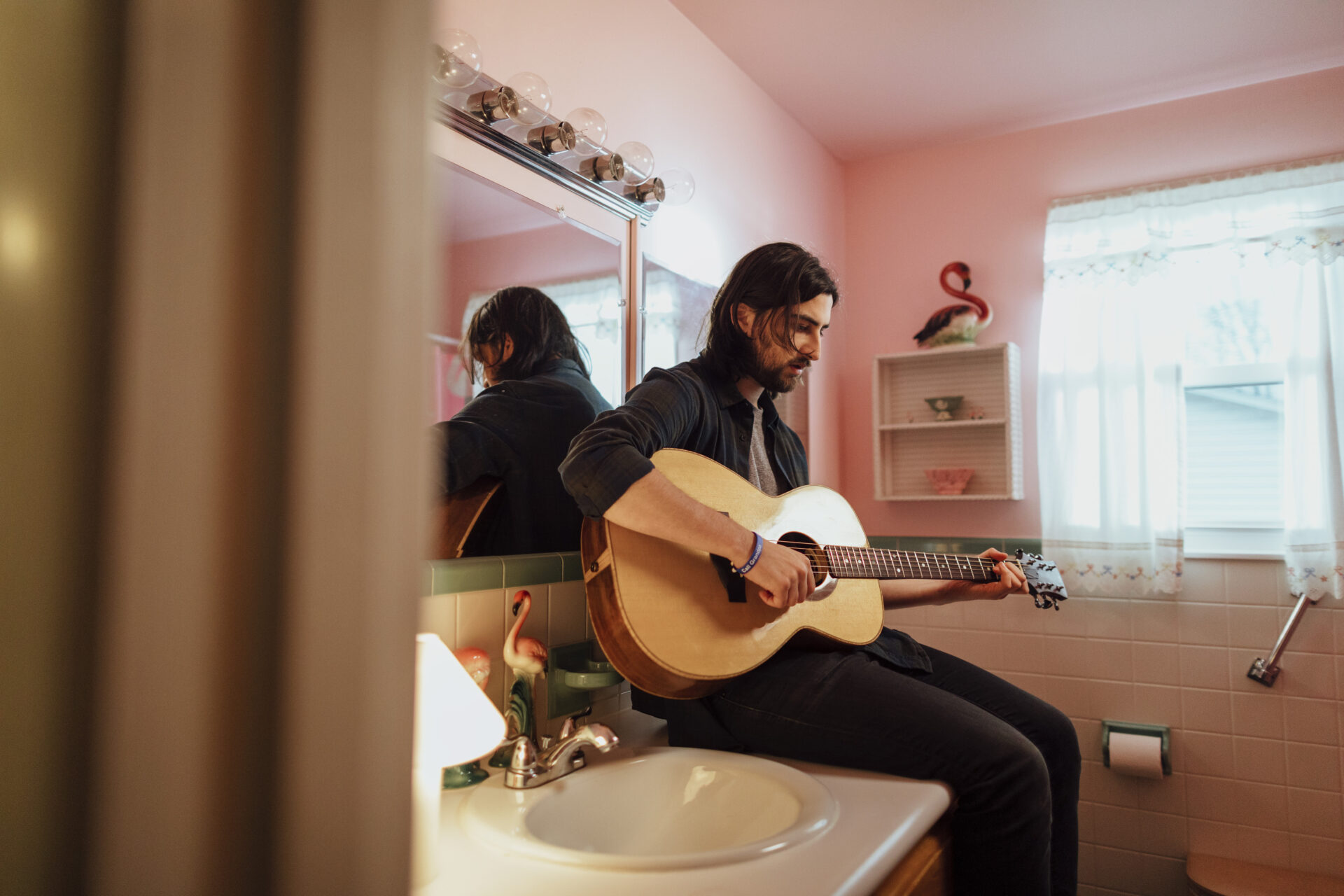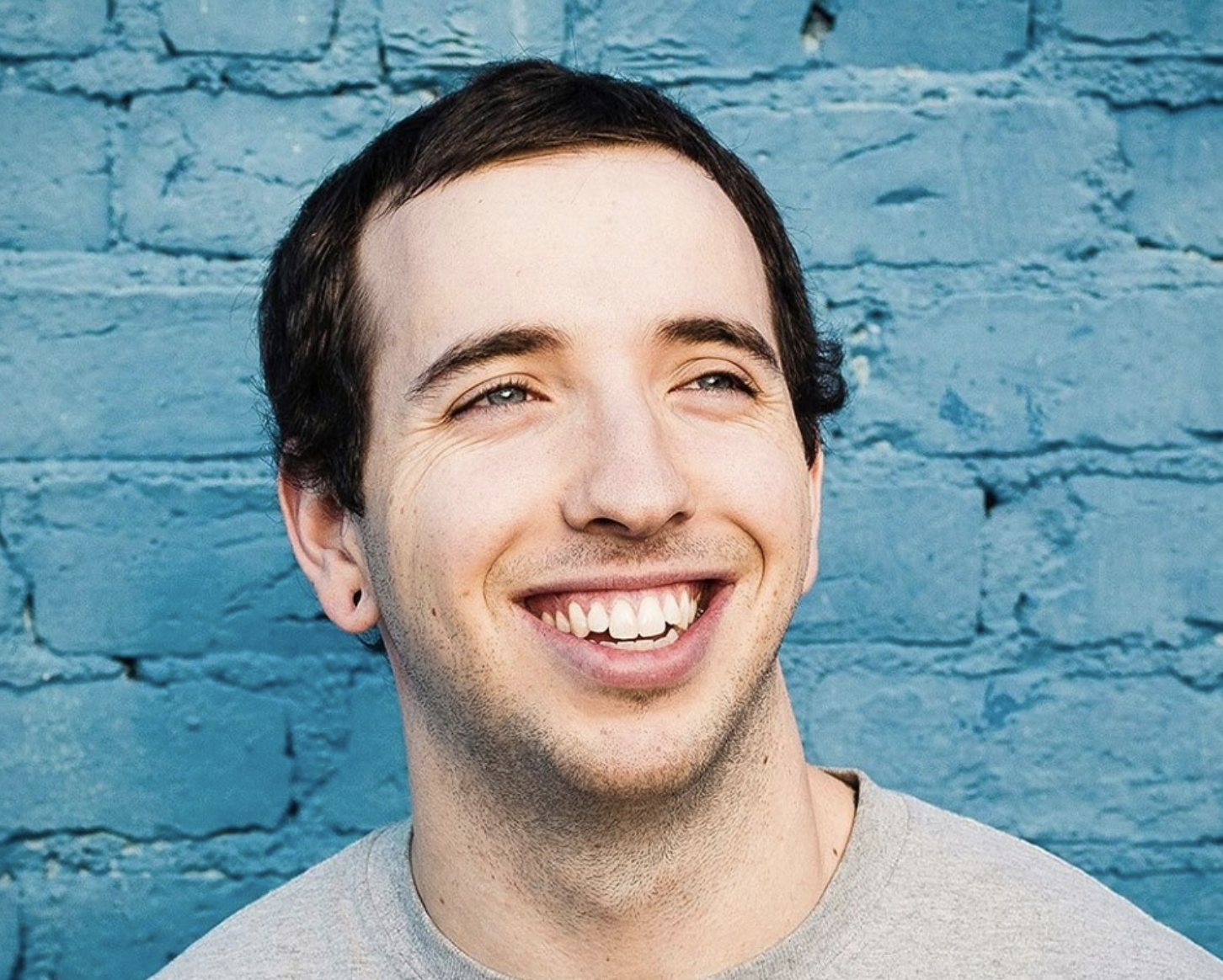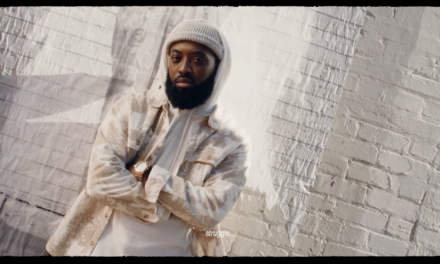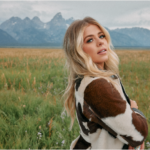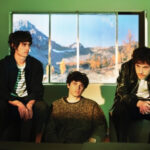Think about realizing your all-time dream. The dream exists and only the good things that you could gain from it it like possible fame, lifestyle changes for the better, or even seeing the world in a different way. Now, think of realizing that same dream and being in it, and it not being the way you wrote the storybook.
With his debut album, Busyhead, singer/songwriter Noah Kahan poses that same question to himself. He signed a record deal at 18 and released a well received EP, Hurt Somebody in 2018. However, you have to take the good with the bad. Being an artist places more demands on yourself and your craft than ever before. Sometimes, you have to go back home where that dream started to find yourself again.
Busyhead is an honest series of snapshots into a particular time in Kahan’s world where he contemplated giving everything up for the comfort of what he knew. The title says it all. When there’s too much noise, it may be hard to hear yourself. Through this seamless mix of pop and folk music, you get to hear an artist through his doubts, his struggles, and ultimately, finding the balance in learning this new normal.
We caught up with Kahan to talk extensively about Busyhead and the thought process that came with his honest and brave debut.
Listening to Busyhead, it comes from a place where you were really homesick. That you were even contemplating giving up your career. There’s a lot of pressures that come with a music career. You initially signed your record deal when you were 18, so it had to be an eye opener when you really got into the thick of it. Walk me through the process of making Busyhead and where you realized this was not everything you initially thought it was?
I think there’s a lot of enchantment and a lot of mystery that surrounds the music industry. You get a record deal and then you’re going to be famous. Then you’re going to tour and release music all over the world. And it’s going to be easy and you’re going to live your dream. I think that some people are afraid to admit that living your dream comes with certain realities that aren’t great and aren’t as exciting that they’d thought it be.
It can be stressful and there’s a lot of pressure. When I signed, I thought that I was going to initially be setting off on this amazing journey. It took a lot more development than that. There’s travel and the appearances that you have to keep up. The aesthetic and social media. I wasn’t really prepared for the reality of the life.
I think the way I deal with those kind of emotions and feelings is writing songs. I wrote songs about what I felt at the time which was to go home. There are moments when I do want to go home and moments when I want to give it up. However, there are amazing moments as well that make it all worth it. I kinda wanted to explore the doubt that you feel of living your dreams and everything you thought it was going to be.
Going into “False Confidence,” there’s a lyric that says “Look at you all dressed up for someone you never see.” With social media, it’s like you have to keep up this appearance that you kind of have it all together. I like that you started off the album addressing this. The composition of the song starts with an acoustic part and then it picks up. Can you go into how “False Confidence” came about?
Sure. I wrote that song at a time where I was realizing the reality of aesthetic. How much emphasis was placed upon me to have a brand and have something about me that was unique. To look unique and to be on social media. Spending time engaging with fans and showing the world who I was.
I wasn’t really sure who I was. I didn’t know what my brand or aesthetic was. I was just writing songs that meant something to me. When I struggle with things, I write about them. That way, I have a little cathartic feeling. I started that first verse with “Don’t take yourself so seriously” just to write a lyric to make myself feel better.
You don’t have to take yourself so seriously. When you’re trying to be someone you’re not, it looks fake. Your identity is going to be stripped away if you try to be somebody else. Your identity is what got you here in the first place. I wrote that verse with that in mind and the chorus was a question to myself. Why do I do this? Why am I building myself up if I’m going to be knocked down?
I like the wildness of the chorus. I like the way it moves. I like the way it kind of feels exasperated. It maintains a real melodic folk-poppy sound, but it asks a real question. When that song had success, I felt a great sense of rewards because I felt that my real feelings and insecurities of changing who I am connected with other people. It was an affirmation that I could be myself and find success that way.
Moving onto “Mess,” I feel that “False Confidence” was about the internal struggle that you had. “Mess” looks more at the macro. You’re seeing the world, but there’s nothing like going back home. There’s a lyric where you mentioned about seeing old friends, but them asking you about how tour was. When you went back home for a bit, how have things changed?
Absolutely, and the place that led me to write about “Mess”. I tried to explore. Where I feel like I don’t fit in here in this world and I don’t fit in the world that I used to be. That’s a scary place. I tried to idealize going back home, but you can’t change the past. You can’t lose what you’ve become. It follows you wherever you go. It does feel like you belong 100% in the music world and that escape you seek so much isn’t really an escape because you don’t really belong there.
I really love home and my friends. The song is a little bit of an exaggeration on both sides. I do feel like there are things that can’t be the same now. I wanted to explore that the grass is also greener, but is it even more green than it used to be? Can you go back to where you came from and forget all the things that’s happened to you?
“Youngblood” was the first song you wrote when you signed to a major label. There’s a cool connection there because the song touches on keeping your individuality. Some artists may feel that once they sign, that they have to give up a lot. Your first statement is to stay in touch with who you are. How important was this song to go on Busyhead?
I thought it was very important. That song was probably the most favorite I’ve ever written. It came from a place where I felt alone and I felt where I was giving myself advice. What was really great is that my label [Republic Records] has given so much support for my vision for releasing music that says something that isn’t always complementary. That isn’t always painting a beautiful picture of life and they let me tell my story.
I think it’s so important for me to be as honest as I possibly can with people. My opinion, and not to be an arrogant asshole – I feel that my honesty is my greatest quality. That’s the thing I use the most effectively. “Youngblood” is a song that speaks to the idea of being somewhere you feel like you don’t belong and how to maintain yourself through that. It’s the overarching theme of this entire journey so far. To not fear the doubt and not fear the people who have become bitter by their doubts and loss.
You worked with Joel Little on this album on about six songs. He’s produced with Lorde and Khaled. How was that?
I cannot say enough amazing things and I cannot express my gratitude deep enough for what’s he done for me. Just how incredible it was to be in the studio with him. With what he’s done with my music, I think he’s seen something in my songs that is valuable. Just to create this mood and universe in the production with these songs that made them unique. He brought out this really special tenderness in both the vocals and the music. From the singer/songwriter thing to this interesting pop/folk sound.
I also can’t speak enough to how great of a guy he is. He’s such a cool dude. Funny. I sat in the studio with him and laughed all day. Then we made these beautiful songs. It was awesome to know that he was working with people along the same pedigree. The fact that he was willing to do something that was not as much pop and R&B. That was a little more earnest and folky was really cool. I’ll forever be grateful for his contribution to this record.
You wrote “False Confidence” back in 2016. As time grows closer to releasing this album, have the older songs taken on a different meaning to you?
What I love about these songs is that they bring me back to exactly what I was feeling and take stock in how much I’ve grown. A song like “False Confidence” where I didn’t know who I was, what I wanted to look like, or how I wanted to express myself. Listening to it now, I really feel that I’ve grown so much. I’ve learned how to express myself and personalize myself with my fans. I’ve found my place.
Listening to “False Confidence,” it’s cool to see how much I’ve grown since then. I definitely heed the message and the moment I wrote that song isn’t something I forget about. Something that I take with me. Songs like “Youngblood” and “Mess” take on new meanings as things change. Times change. You tour the world and go home and learn how to deal with things.
I’m still learning to handle a lot of this shit. It’s caused me so much anxiety and unfortunately, a lot of depression the last few years. Dealing with the schedule and everything that comes with this lifestyle. These songs are these little vignettes into moments of my life where I felt overwhelmed or felt afraid. It allows me to see and feel the growth in a tangible way when you hear these songs.
As I listened to this album, on a musical level, Busyhead bridges a gap between the pop and folk which new fans are going to appreciate. When making this record, was there an importance on bridging the gap between these two genres sonically?
That’s a good question. I don’t really think about it. I just kind of write the songs. I think about the emotions of the songs. The chord structure, the chords, and what sonic sound that needs to happen to express these emotions. That’s why great to have a producer who can put these emotions in the spectrum of folk and pop. We were able to play with organic sounds and more electronic sounds. I don’t feel like it’s too folky or too poppy. It found this perfect place.
There’s only so much I can focus on. I can focus on writing songs. I can focus on being emotional and then you have to let the professionals help you figure out the rest. I was never a visionary musician that could play six chords on the guitar. Having these collaborators expand the sound and bridge that gap has been so valuable. It was super important to me to make this record feel unique.
In the singer/songwriter genre, there’s a trap you can fall into where everything sounds like a ballad, too folky, or too poppy. I just wanted to make sure it was a unique combination of the two and I’m really stocked with how it came out.

